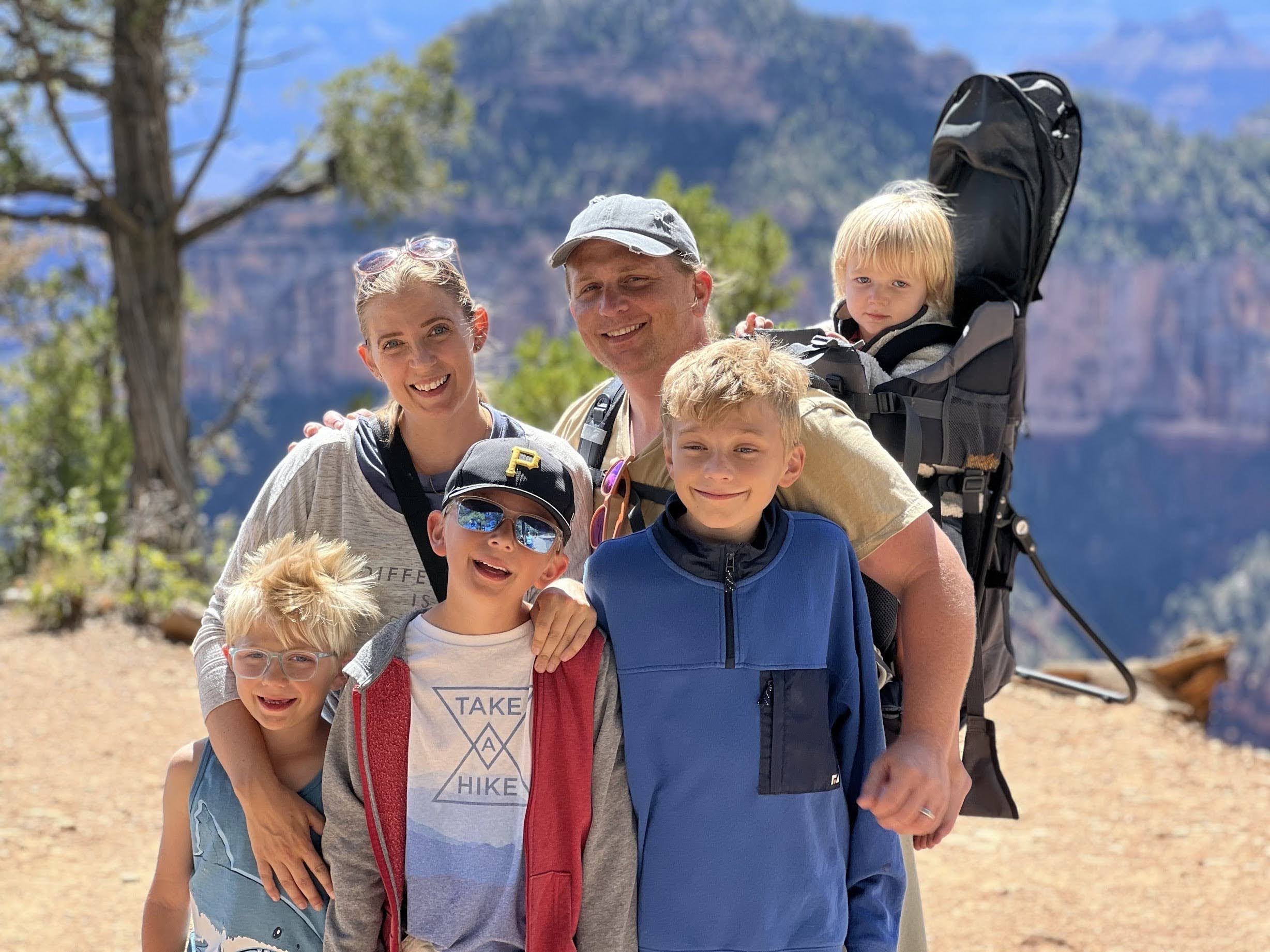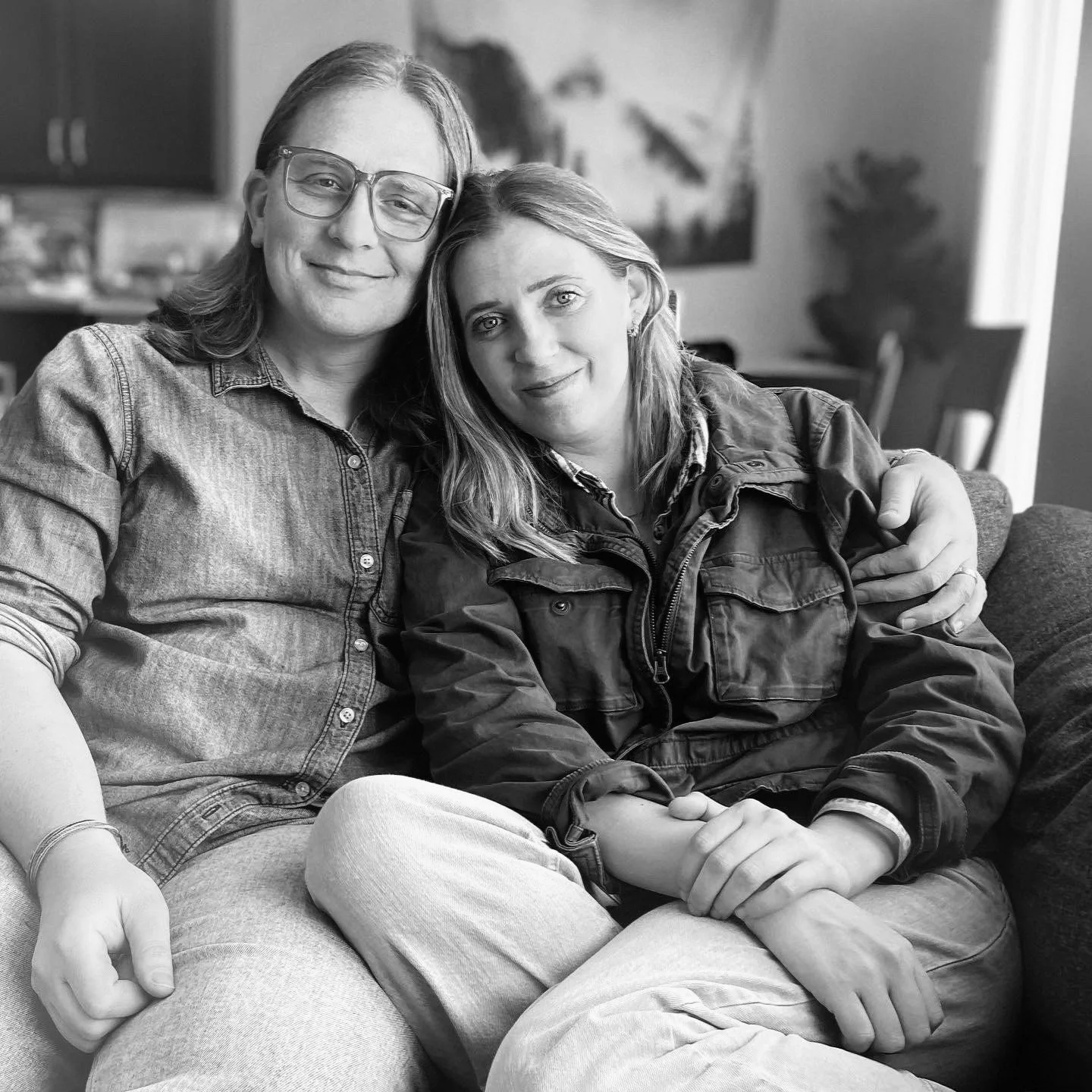Content warning: suicidal ideation
Kathryn and Jare (rhymes with “care”) Jenkins had been married for eight years and were expecting their third child when Jare handed Kathryn an eye-opening letter. Kathryn opened it to read that the husband who she had met and fell in love with and married in the Salt Lake City LDS temple was now coming out to her as transgender. Kathryn was in complete shock: “It was a lot to process. I was emotional. It was a hard time for both of us.” Further complicating things, as soon as Jare (they/them) came out to Kathryn, they immediately went back into the closet, not ready to talk about it.
That was in 2015, and the not talking about it continued for another five or six years. Whenever Kathryn would ask Jare how they were doing, Jare would reply everything was fine, they could handle it. But downplaying it only elevated Kathryn’s concerns. She says, “Jare was used to hiding a lot of things and good at playing a part. We were happy in many ways, but this part of our lives was always hard.”
Around 2021, everything fell apart. Jare let Kathryn know they had been battling suicidal ideation for the past several years among hiding other significant things throughout their marriage. Feeling that Jare needed to seek outside help and support, she asked for a separation and Jare moved out for awhile. Jare remembers this as a time they felt like two different people. Jare says, “I was happy with certain things in life, like my relationship and family. But on my own, I focused a lot on negativity, feeding on any negative articles and comments I could find. I felt a lot of resentment and anger.” Jare credits Kathryn as being an immense support, saying, "Even though my life was caving in, Kath really saved me during that time. We separated but she still helped see me through a mental health crisis as I had to face everything I had been hiding; she didn't give up on me."
Having grown up in a conservative, southern California, LDS household, Jare had experienced a lot of shame with the way they’d felt since age three or four when they first knew they were different but didn’t have a word for it. There were a few instances in Jare’s youth when they dressed up in feminine clothing or attempted to deal with body parts in a way deemed socially unacceptable, and it was made clear through comments from family or church members that it was not okay to identify as LGBTQ. Instead, Jare threw themselves into sports to throw people off, “trying to be the best athlete possible so no one would ever realize I was transgender.” Their efforts resulted in Jare in fact becoming a national punt pass kick champion, and their team won the Little League World Series against Venezuela. As a teen in the ‘90s, Jare saw a Jerry Springer episode about transgender people, and even though the trans guests were not talked about positively, it was helpful for Jare to know they were not the only person in the world experiencing these feelings. But when Jare told a few close friends as a teen about their feelings, the friends never spoke to Jare again.
While coming of age, Jare says, “I figured I had three choices: 1- to take my life, which I considered a number of times; 2- to run away--leaving my old life behind and letting go of past relationships, and transition, or 3 – to hide and not let anyone know, which is what I tried to do.” Because of all the shame they’d suffered as a child, Jare never considered a fourth option as even possible: to come out and be accepted.
While it took some time for Jare to talk about it with Kathryn after that initial letter, because of the couple’s love for each other and their four sons, they came back together after their separation to try and work it out. They would go on long walks each evening, in which Jare opened up and shared earlier life experiences and all those pent-up feelings of shame. These conversations gave Kathryn time to listen, ponder, and process. She says, “I saw how much pain there was going on underneath, and just how long Jare had handled this alone… Jare was also responsive to me—how hard this was to have a relationship with someone who had lied for over 15 years in our marriage about what was going on. But still, we shared a lot of love and wanted to be together, which is why we are.” Kathryn says now they focus “a lot on the day to day, making the right decisions for us now, and knowing there are a lot of things we don’t have full control over. We’re working our way through that.”
As the parents of four young boys, two of whom are on the autism spectrum, Kathryn felt it was important to increase conversations about inclusion and kindness. In 2016, she had started her company the @inclusion_project, to not just shine a light on LGBTQ inclusion but toward anyone living with differences. This afforded her opportunities to participate in PRIDE parades and get to know those in other marginalized. She and Jare have adopted three mantras to guide their household: 1- Love should lead. 2- Be a good human. 3- Be careful who you hate; it could be someone you love. Embracing these themes helped their kids come to terms quickly with Jare’s identity, which at first was deemed “a little weird” by one of the boys, but now the Jenkins say their kids are very accepting and loving and they all talk openly about it. Jare appreciates how all the fears and worst-case scenarios they once had about how things would go if they came out have turned out to be much easier than imagined.
Most Sundays, Jare attends sacrament meetings with Kathryn and the boys, but goes home after, while they stay for their classes. Jare says, “I’ve had a complicated relationship with the church over the years--how things have been taught and the shame it brought me, especially in my youth. It was hard for me to see the differences between my relationship with God and His feelings about me, and with the church leaders and policies I’d hear. I felt God must hate me to have made me this way. But now, I’m working through these feelings. Now I believe that if there is a God, He loves everyone. I’m able to feel much more love now that I’m able to be who I am and how I feel.”
Kathryn’s spiritual journey is one that brings her to tears when she considers how “Heavenly Father loves me, and He equally loves Jare.” While she has a calling at church and says she gets something out of it often when she goes, she feels, “It’s not a safe place for everyone. I’ve had to adjust how I participate to preserve my relationship with God and my family.” Doing this has allowed her to have a lot of empathy for those going through difficult things and to give hugs to many at church as she realizes, “We’re all going through hard things—but there’s a lot I have questions about.”
One youth leader from Jare’s past who was “pretty awesome” made a real difference in their life, and was one of the only people in 2021 who Jare came out to, besides family. Many of the both Jare and Kathryn’s extended family have also been “incredibly kind and accepting,” though there have been some who haven’t been so supportive. Jare came out publicly last New Year’s Eve on Kathryn’s Instagram account, and the couple watched in trepidation after they pressed post. They were pleasantly surprised to see a steady stream of supportive comments, without anyone saying anything negative. Jare dresses differently now to match how they feel and they do participate in some gender affirming care that they say has helped a lot, but they haven’t fully socially or physically transitioned at this point. At church and in their neighborhood, Kathryn says they feel the eyes on them, and are nervous about sensitive questions some might ask about what this means for the Jenkins’ relationship, but feel they have mostly been met with kindness during Jare’s coming out.
In their ward, Kathryn says more people reach out to her to ask about Jare than to Jare directly, but, “In all fairness, Jare is very shy. They might get a little nervous about how best to approach.” Kathryn feels the weight of this and wishes sometimes she could just be Jare’s partner, a role she loves, rather than feeling like she has to be an educator or advocate all time. But those are also roles she owns as the mother of two kids with autism—she often wants to lead with introductory information, so people don’t say something offensive first. It helped when Kathryn and Jare recently recorded their story on their Spotify podcast; the link is available at their bio on their @inclusion_home IG site.
While Kathryn and Jare were worried about what Jare’s public coming out would look like, they have both felt “an incredible peace that has been freeing,” says Kathryn. “Seeing Jare as someone who is loved, who matters, who has these feelings and can still be valued, has also allowed me a chance to love and receive love and support from others.” Kathryn continues, “Even if it hadn’t gone well, we both feel giant relief and were able to take a deep breath for the first time.” For Jare especially, it’s been a long-awaited deep breath.

































